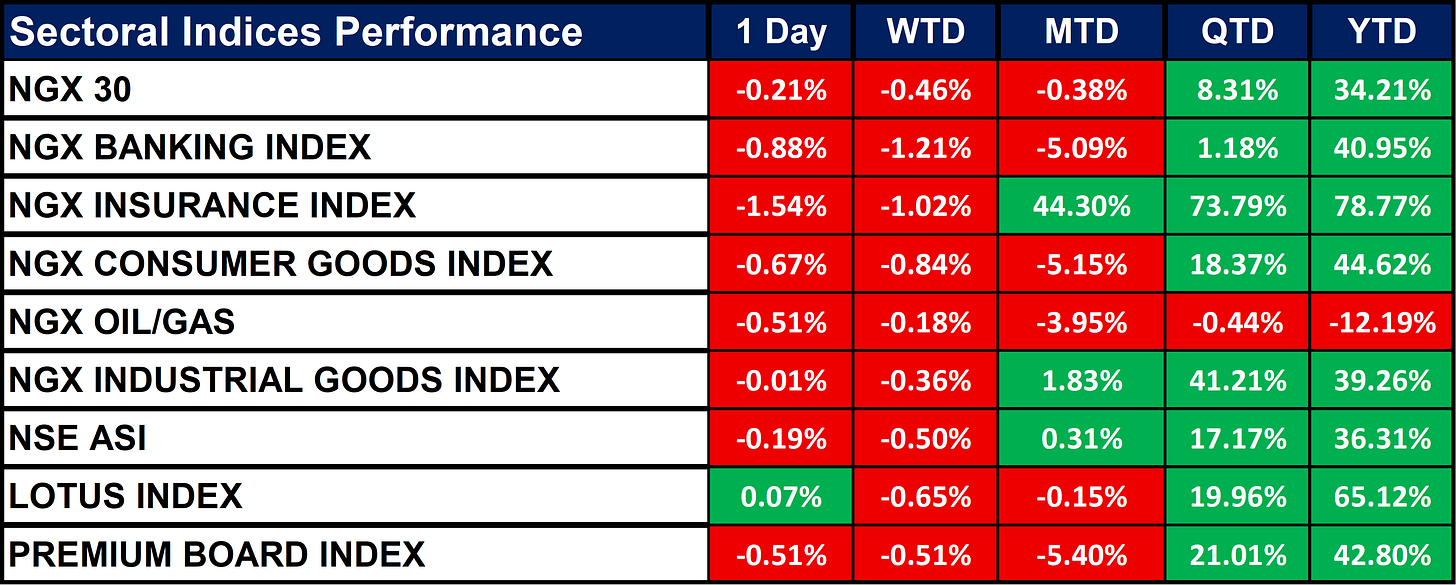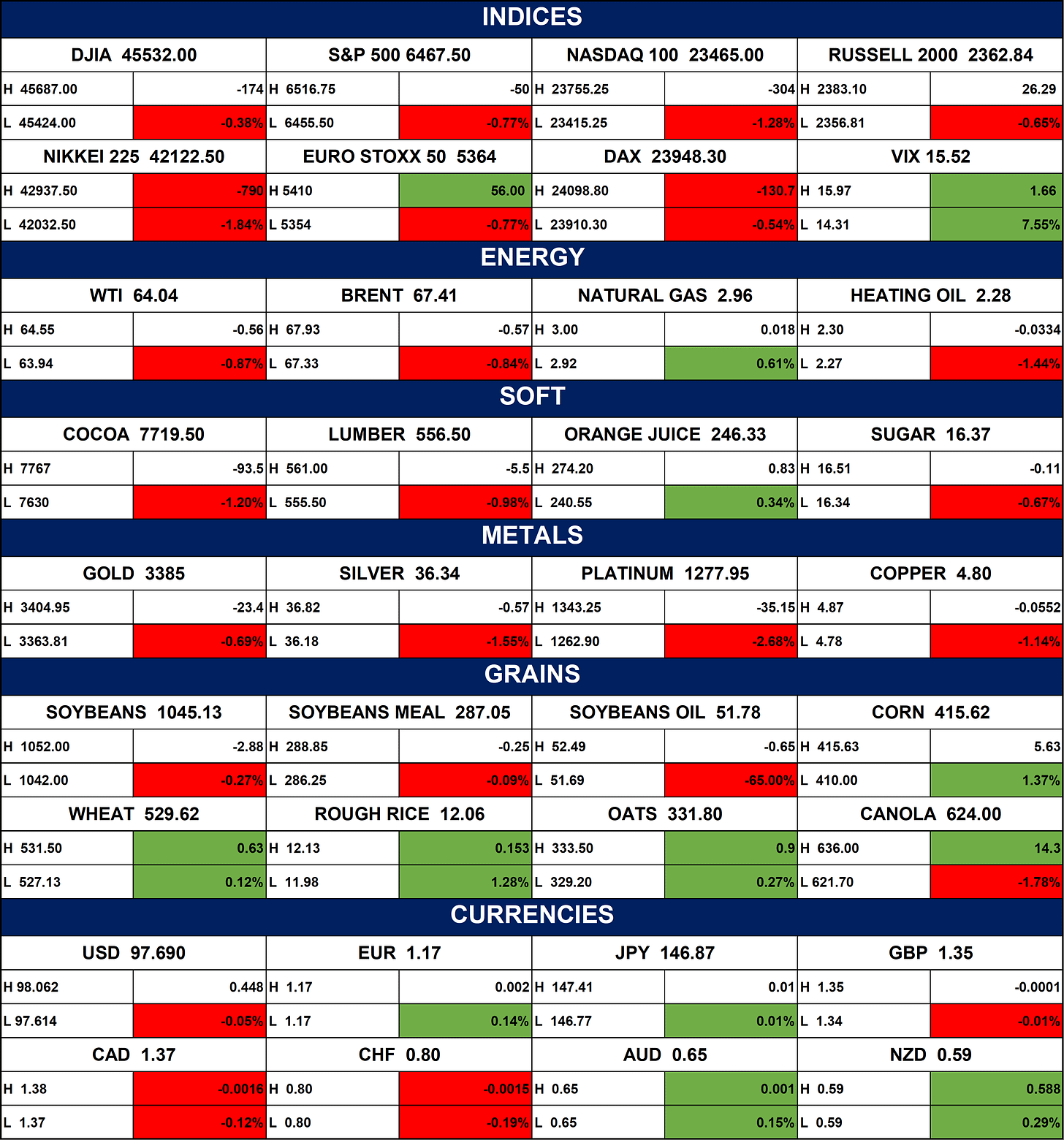Finance Friday - Nigerian Corporate Developments and Global Inflationary Pressures Drive Market Volatility Ahead of Key Policy Decisions
Ranora Daily - Your daily source for reliable market analysis and news.
Market Overview
Good evening and welcome to your Friday market wrap up. This week, markets showed caution as investors reacted to mixed news from Nigeria and around the world. In Nigeria, GTCO met its recapitalization target, leadership changes occurred at Access Holdings, and NNPC announced plans for major refinery investments amid transparency concerns. Rising bond yields are pulling investors away from equities, with the oil and gas sector underperforming. Globally, inflation pressures, economic slowdowns, and trade tensions are creating uncertainty. U.S. oil production hit record levels, easing supply worries. Overall, rising volatility is driving a shift toward safer, fixed-income assets.
Nigerian News & Market Update
GTCO hits N500 billion recapitalisation target after rights issue:
Guaranty Trust Holding Company (GTCO) raised ₦365.9 billion via a rights issue to help its banking unit meet the new ₦500 billion minimum capital requirement for banks with foreign subsidiaries. The funds will support expansion and upgrades, increasing GTBank’s share capital to over ₦504 billion. GTCO also recently listed on the London Stock Exchange to attract foreign investors. Banks must meet new capital rules by March 2026. - PremiumTimes
Innocent Ike takes over as Access Holdings GMD/CEO:
Access Holdings Plc has appointed Mr. Innocent Ike as Group Managing Director/CEO, effective August 29, 2025, following regulatory approval. He replaces Ms. Bolaji Agbede, who served as acting CEO after the former CEO’s death. Roosevelt Ogbonna resigned from the holding company’s board to comply with new Central Bank of Nigeria rules but remains CEO of Access Bank Plc. The changes reflect a new leadership phase under Chairman Aigboje Aig-Imoukhuede. - DailyTrust
NNPCL seeks $60billion investment for 500,000bpd refining:
The Nigerian National Petroleum Company Limited (NNPCL) plans to invest $60 billion to expand Nigeria’s refining capacity to 500,000 barrels per day and increase crude oil production to 3 million barrels per day by 2030. Currently, Nigeria’s three refineries are non-functional despite maintenance efforts. The company is focusing on key projects like the Ajaokuta-Kaduna-Kano gas pipeline to boost the economy. Nigerian National Petroleum Company Limited (NNPCL) faces opposition but remains committed to its transformation goals. The Nigeria Extractive Industries Transparency Initiative (NEITI) has called for improved transparency in NNPC’s disclosures, while the oil workers’ union, PENGASSAN, supports the company’s management. - DailyTrust
Robust demand and rising yields at FGN bond auction signal strategic shift toward fixed income:
In August, Nigeria’s Debt Management Office auctioned ₦200 billion in government bonds but allotted only ₦136 billion due to fiscal caution. Bond yields spiked to around 18%, driven by high inflation and tight monetary policy. This has made short- to medium-term government bonds attractive for investors seeking stable, inflation-beating returns. As a result, investors are expected to shift from equities to bonds, favoring safer fixed-income investments and defensive stocks in the current volatile market. - dmarketforces
NEITI applauds $6billion Foreign Direct Investment (FDI) in Deepwater, gas projects:
The Nigeria Extractive Industries Transparency Initiative (NEITI) praised over $6 billion in foreign investments boosting Nigeria’s deepwater and gas projects, highlighting increased local ownership in the oil and gas sector. NEITI urged NNPC to improve transparency by regularly publishing financial and production data and recommended creating a dedicated EITI/NEITI compliance unit to strengthen governance and maintain Nigeria’s reputation in the energy industry. - TheNation
Nigeria’s Excess Crude Account Now Stands at $535,823 Says Accountant General of the Federation (AGF):
Nigeria’s Excess Crude Account (ECA) has dropped significantly to $535,823 as of August 2025, down from $2.2 billion in 2015 and a peak of over $20 billion in 2008, due to frequent withdrawals for budget needs and subsidies. The Stabilisation Account holds ₦78.45 billion, and the Natural Resources Development Fund has ₦106.73 billion. At a recent National Economic Council meeting, officials unveiled the Renewed Hope Development Plan (2026–2030), aiming to build on current reforms and drive Nigeria toward a $1 trillion GDP, aligning with long-term national goals. - BusinessDay
Nigeria Sectoral Indices Performance
The table below shows that most NGX sector indices declined over the day and week, with the Insurance Index dropping the most. However, performance over the month, quarter, and year remains strong overall. The Insurance, Industrial Goods, and Lotus Index show significant year-to-date gains, while Oil/Gas is the only sector in negative territory for the year.
Fixed Income (FGN Bonds)
Global News & Market Update
Core inflation rose to 2.9% in July, highest since February:
U.S. core inflation rose to 2.9% in July, the highest since February, driven mainly by higher service costs. The increase aligns with forecasts and reflects the impact of Trump-era tariffs. Consumer spending and personal income also rose, showing economic strength despite rising prices. Markets expect the Federal Reserve may cut interest rates in September if job data weakens further. - CNBC
Canada's second-quarter GDP contracts, rate cut bets increase:
Canada's economy shrank by 1.6% in Q2 2025 due to falling exports from U.S. tariffs the first contraction in nearly two years. Despite this, strong household and government spending helped offset the decline. With three straight months of GDP drops and weak business investment, chances of a Bank of Canada rate cut in September have risen. - Reuters
US low-value package tariff exemption ends, raising costs for shippers, consumers:
The U.S. has ended its $800 tariff exemption on imported packages, applying full duties to all shipments regardless of value or origin. The move, aimed at curbing drug imports and boosting tariff revenue, impacts e-commerce firms like Shein and Temu, small businesses, and global postal services. Prices may rise, and shipping delays are expected. Some postal services paused shipments, while others are adapting to the new rules. - Reuters
Brazil starts formal process to assess US tariff retaliation:
Brazil is considering retaliatory tariffs against the U.S. after President Trump imposed 50% duties on Brazilian imports. In response, Brazil’s Foreign Ministry has ordered trade body Camex to assess using a new reciprocity law passed by Congress. Camex has 30 days to report, and if approved, Brazil may target specific U.S. sectors. While Brazil has begun WTO consultations, officials remain open to negotiations. Key exports like orange juice and aircraft were excluded from the U.S. tariffs. - Reuters
US oil production hit record high in June, EIA says:
U.S. crude oil production reached a record high of 13.58 million barrels per day in June, according to the Energy Information Administration. Demand also surged, with total petroleum product consumption hitting 21 million bpd the highest since October 2024. Gasoline demand rose to its highest level since July 2024, while jet fuel demand hit its highest since August 2018. - Reuters
India's April-July fiscal deficit at 29.9% of 2025/26 target:
India's fiscal deficit from April to July reached 4.68 trillion rupees ($53.48 billion), representing 29.9% of the full-year estimate. Net tax receipts stood at 6.6 trillion rupees, slightly lower than last year, while non-tax revenue increased to 4 trillion rupees. Total government expenditure rose to 15.6 trillion rupees, with capital expenditure growing to 3.5 trillion rupees, up from 2.6 trillion rupees the previous year. - Reuters
Indices, Commodities & Currencies
The table below Depicts that markets showed broad weakness, with global stock indices mostly down notably the Nikkei 225 and NASDAQ 100 while Euro Stoxx 50 was the only major gainer. Energy and metals declined, though natural gas edged up. Soft commodities mostly fell, except for a small rise in orange juice. Grains were mostly positive, led by gains in corn, rough rice, and wheat, while canola dropped. The VIX spiked over 7%, signaling rising market volatility. Currencies remained largely flat with minor movements.
Fixed Income (USA Bonds)
Events
Conclusion
As September nears, markets face ongoing volatility driven by U.S. and Canadian central bank moves, inflation concerns, and global trade tensions. In Nigeria, key corporate changes and NNPC’s large-scale plans add to the landscape amid calls for greater transparency. Investors are expected to favor fixed income and defensive stocks, while equities remain under pressure until clearer inflation and rate signals emerge. Staying flexible and focused on resilient sectors will be essential.
Thanks for reading Ranora Consulting! Subscribe for free to receive new posts and support my work.







